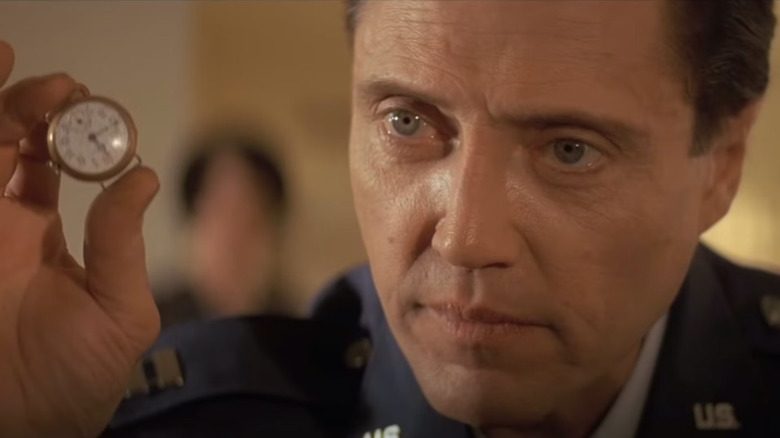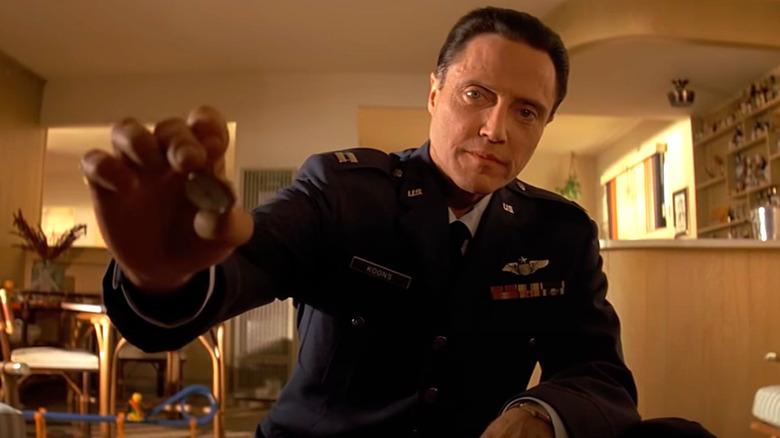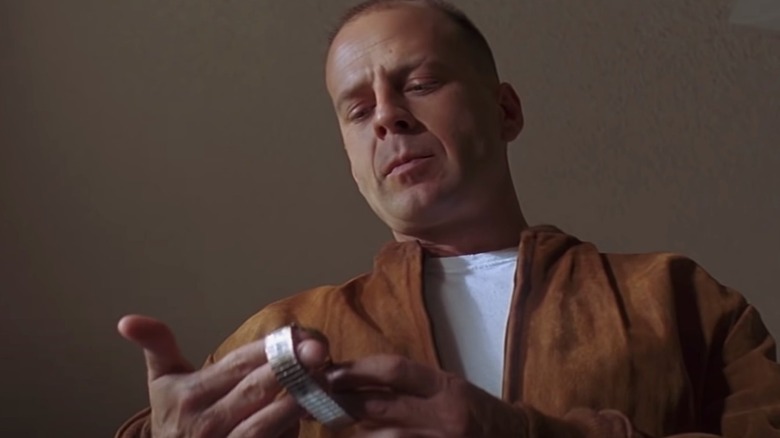Quentin Tarantino's Pulp Fiction Was A Rare Opportunity For Christopher Walken
Considering Christopher Walken's entire filmography and legendary cadence, it's a little surprising that the infamous watch speech he delivers as Captain Koons in "Pulp Fiction" is, to the best of my recollection, the longest monologue the Oscar-winning actor has ever given on screen. In "True Romance," Walken gives another lengthy speech describing his unparalleled lie-detection skills, but Dennis Hopper's dead man walking history lesson takes the spotlight away from him rather convincingly.
One of the benefits of having a writer-director on set is being fairly confident that the dialogue you're memorizing and delivering won't be cut out of the final edit. Walken's speech chronicling how a family heirloom was carried down through three generations of soldiers is not only hilariously epic, it's also a crucial plot detail. Koons is telling the story to Butch (Bruce Willis) as a young boy in the early 1960s. Cutting to present day, he double-crosses Marsellus Wallace (Ving Rhames) by refusing to throw a boxing match. Before he can leave town, though, he has to go back to get his lucky watch that his girlfriend Fabienne (Maria de Medeiros) supposedly forgot to pack.
If Walken never gave that riveting, somewhat traumatizing speech to Butch, Vincent Vega (John Travolta) would have lived another day and Butch and Marsellus wouldn't have ended up in a basement with a couple of degenerates and a gimp. For Walken, the pivotal speech was the main reason to take on the role of Koons, according to an interview with Tarantino in Film Comment in July of 1994. "He's just so great at doing monologues, about the best guy that there is at it, and that's why he did the movie, because he doesn't get the chance to do three-page monologues in movies knowing it's not gonna be cut."
A story in three parts
The entire Captain Koons speech is shown through Butch's point of view to convey just how indelible this encounter was to him as a kid. The horror of finding out that this man hid the watch up an orifice for safekeeping is inherently disturbing, especially to a child. Then, the fact that Koons hands him the watch directly after this unbelievable story probably scarred Butch for life. How could he not keep this watch and protect it at all costs after hearing the arduous journey it has endured through multiple decades and three major wars?
In the scene, Walken nails the balance between the comedy of the story and the utter seriousness of Koons, who is obviously proud to finally share this twisted family history with Butch. To make sure the monologue captured all the right nuances, Tarantino shot the scene 13 or 14 times and cherry-picked the takes that best fit the three-pronged story that Koons was telling. Tarantino explained the decision-making process to Film Comment, saying:
"He's telling a three-part story about the First World War, the Second World War, and then Vietnam, and all three beats are very different. So I could use the more humorous take on the First World War and then the Second World War story where he's talking about Wake Island, which is more tragic. I took his darkest take, and then for the Vietnam story I took his most irreverent one, which is the funniest."
The speech is capped off perfectly when Koons finally hands Butch his rather paltry birthright and says, without any embarrassment whatsoever, "... and now, little man, I give the watch to you." It's undoubtedly one of Walken's best performances even if he's only in "Pulp Fiction" for a few unforgettable minutes.
So, what kind of watch was it?
There are a lot of famous watches throughout film history. Once you become an aficionado, it's hard not to start documenting every timepiece in classic movies with the hopes of maybe one day tracking them down. For example, Ripley's Seiko Giugiaro watch from "Aliens" has become fairly hard to find, despite a re-release by the Japanese brand a few years ago. The Rolex Datejust that Patrick Bateman (Christian Bale) wears in Bret Easton Ellis's "American Psycho" will set you back about four thousand dollars, but may prove a little too gaudy for the hoi polloi who have no interest in looking like a Wall Street yuppie. One of the most famous watches of all time is Sean Connery's Rolex Submariner 6538 (retail $46,189.00) from "Dr.No," yet the most expensive watch ever is Paul Newman's Rolex Daytona that sold for a staggering $17.8 million at auction back in 2017.
So, what kind of watch was passed down to Butch? Is it worth anything besides its obvious sentimental value? The watch seen in "Pulp Fiction" is actually an antique Lancet Gents wristwatch that, sadly, wouldn't go for much at a pawn shop if Butch ever fell on hard times. Not surprisingly, Tarantino did do his research though. The Lancet watch was first made in 1918, so it could very well have been worn and safeguarded by a soldier during the First World War. Thousands of these relatively inexpensive hand-wound models were made around that time, but surely, none of them have quite the same story as the one Butch is bequeathed in Tarantino's masterwork.


